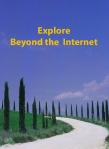 This is Week 11 in my Beyond the Internet series in which I explore the sources of information beyond our computer screens. This week’s topic is Church Archives. I’d love it if you wanted to join in with your thoughts on this topic. If possible please provide a link to your post on this page.
This is Week 11 in my Beyond the Internet series in which I explore the sources of information beyond our computer screens. This week’s topic is Church Archives. I’d love it if you wanted to join in with your thoughts on this topic. If possible please provide a link to your post on this page.
First up, let me say that I’ve never used church archives overseas so can’t speak about them there. Perhaps some overseas bloggers can comment on that? My comments will mainly refer to the benefits of using the Australian Church Archive relevant to your ancestor’s location. For me personally that means Queensland church archives, Catholic and Anglican.
Australian civil registration dates mostly from the early-mid 19th century, with the precise date being determined by each state. Cora Num’s website provides a useful guide to these dates. If this is the case why do we need to bother with church records?
I don’t know about you, but I have a number of early certificates with lots of blanks, usually in the fields that would be most useful eg place of birth. It was only by turning to parish registers held either in the parish or the local archives, that these blanks were (mostly) filled in. The information I obtained in this way, broke down what would otherwise have remained insoluble brick walls. For example, I could never have taken my George Kunkel back to his home village of Dorfprozelten without this parish information. On no other documentation, including several of his children’s birth certificates, does he give his specific village of origin. You can read more about this story here
Similarly the marriage of Hannah Kent and William Partridge obtained through the Anglican Archdiocesan Archives enabled me to clarify several points about their background.

In researching the Bavarians from Dorfprozelten I’ve used church archives to great advantage. It’s rare that the marriage entries in the church registers don’t add something to what I know about these immigrants. If you’re searching for multiple people it can also be cheaper to do it this way, even allowing for a daily fee or a donation. Compare the cost to buying another certificate: surely it’s worth knowing you’ve explored all the options. I always encourage people with apparent brick walls to try this strategy. Unfortunately until you’ve seen the benefits, not everyone is convinced that they could tumble those walls in this way.
As with any archive, the records held will vary depending on what has survived and what has been transferred: some records may be in a garage somewhere. Some of the things you might like to ask about, in addition to the standard baptisms and marriages, are communion records, confirmation records, and society records. The archive may also have old books or newsletters which will tell you more about your ancestors’ churches in their era: all grist for your family history.
I’ve recently been fortunate enough to be thought of when there was a clean-up of surplus holdings and in this way obtained a 93 year-old church-based certificate which had once been in my ancestor’s original property. My great-great grandmother’s youngest son had the house blessed when his family took ownership after she died in 1919. Without my link to the archive this would never have come to light.
Where to find the relevant church archives? Well I’d tend to look up the local phone book first (under the name of the religion) but really a better strategy in Australia would be to use this Australian Society of Archivists search page. Similar societies exist overseas.
Please don’t forget when visiting churches or archives, that they have other purposes than helping family historians and may be time-limited. While some have fixed daily fees for research, others don’t specifically ask for money. I recommend always offering a decent donation for the service they provide.
Here is my offering http://anglersrest.blogspot.com/2012/03/beyond-internet-week-11-church-archives.html
LikeLike
Thanks Julie, I really enjoyed your post and have commented over there.
LikeLike
That Australian Society of Archives search page is a great link. Thanks!
LikeLike
Glad it’s useful Prue.
LikeLike
Just read this post, Pauleen. I liked seeing the Sacred Heart image; it reminded me of how my Mom used to keep a similar blessed Sacred Heart image in our home (except that it was worded in French).
LikeLike
Thanks Yvonne. Yes it brings back memories doesn’t it…apart from the language differences.
LikeLike